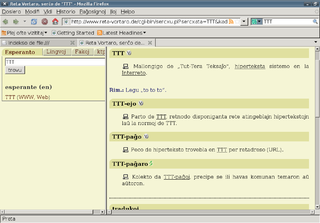
Esperanto is the world's most widely spoken constructed international auxiliary language. Created by L. L. Zamenhof in 1887, it is intended to be a universal second language for international communication, or "the international language". Zamenhof first described the language in Dr. Esperanto's International Language, which he published under the pseudonym Doktoro Esperanto. Early adopters of the language liked the name Esperanto and soon used it to describe his language. The word esperanto translates into English as "one who hopes".

Esperantujo or Esperantio is the community of speakers of the Esperanto language and their culture, as well as the places and institutions where the language is used. The term is used "as if it were a country."

Ido is a constructed language derived from a reformed version of Esperanto, and similarly designed with the goal of being a universal second language for people of diverse backgrounds. To function as an effective international auxiliary language, Ido was specifically designed to be grammatically, orthographically, and lexicographically regular. It is the most successful of the many Esperantidoj.
The Esperantic Studies Foundation, abbreviated ESF, is a non-profit organisation initiated in 1968 by Jonathan Pool, E. James Lieberman and Humphrey Tonkin, with the aim to further the understanding and practice of linguistic justice in a multicultural world, with a special focus on the study of interlinguistics and the role of Esperanto.

The Trenčín Region is one of the eight Slovak administrative regions. It consists of nine districts (okresy). The region was established in 1996: previously it had been a part of the West Slovak Region and partly the Central Slovak Region. Industry is a major sector of the region's economy.

Émile Boirac was a French philosopher, parapsychologist, promoter of Esperanto and writer.
Interlinguistics, also known as cosmoglottics, is the science of planned languages as it has existed for more than a century. Formalised by Otto Jespersen in 1931 as the science of interlanguages, in more recent times, the field has been more focused with language planning, the collection of strategies to deliberately influence the structure and function of a living language. In this framework, interlanguages become a subset of planned languages, i.e. extreme cases of language planning.

The Esperanto Wikipedia is the Esperanto version of Wikipedia, which was started on 11 May 2001, alongside the Basque Wikipedia. With over 360,000 articles as of October 2024, it is the 37th-largest Wikipedia as measured by the number of articles, and the largest Wikipedia in a constructed language.
The original word base of Esperanto contained around 900 root words and was defined in Unua Libro, published by L. L. Zamenhof in 1887. In 1894, Zamenhof published the first Esperanto dictionary, Universala vortaro, which was written in five languages and supplied a larger set of root words, adding 1740 new words.

Plena Ilustrita Vortaro de Esperanto is a monolingual dictionary of the language Esperanto. It was first compiled in 1970 by a large team of Esperanto linguists and specialists under the guidance of Gaston Waringhien and is published by the Sennacieca Asocio Tutmonda (SAT). It may be consulted online for free.
Montagu Christie Butler was a British academic, librarian, lexicographer, musician, and Esperantist. A winner of several prizes at the Royal Academy of Music in London, he was a harpist and a versatile music teacher skilled in playing various musical instruments, as well as a teacher of voice and of musical composition.
Blažej Baláž is a Slovak contemporary artist. His practise as an artist is usually associated with political art, environmental, activist, mail-art and neo-conceptualism. After 1988 he began working with text as art, neo-conceptual and post-conceptual texts.

Michel Duc Goninaz was a French Esperantist known worldwide for his 2002 revision of La Plena Ilustrita Vortaro de Esperanto.

Reta Vortaro is a general-purpose multilingual Esperanto dictionary for the Internet. Each of the dictionary's headwords is defined in Esperanto, along with additional information, such as example sentences, to help distinguish the subtle shades of meaning that each particular word form may have.

Peter Baláž, in Esperanto known as Petro, is an Esperantist, publisher and editor; he was selected as the 2012 Esperantist of the Year. Baláž lives in his hometown of Partizánske and speaks Slovak, Czech, German, Polish, Russian and English, as well as the international constructed language Esperanto.
Claus Killing-Günkel, in Esperanto also known as Nikolao Günkel, is a German teacher and interlinguist.

Summer Esperanto Study is the biggest annual international event aiming to teach Esperanto. It occurs every summer since 2007, lasts for a week and attracts up to 250 participants from 30 countries, being aimed both at beginners and fluent speakers of the language. The event is organised by E@I and usually takes places in Slovakia, with the exception of 2014 when it also occurred in Russia. It has been supported several times by the Slovak ministry of education and the local mayor. In its first year, the event had a narrower focus and was called Slavic Esperanto Study.

Esperanto has been used in Slovakia since the 19th century. The Slovak Esperanto movement was suppressed by Nazi and Communist regimes in the 20th century before being restored in 1969. Slovakia is home to the Summer Esperanto Study and the Conference on the Application of Esperanto in Science and Technology.

Abram Antoni Kofman, also known as Abraham S. Kofman, was a Russian-Jewish accountant, and poet and translator in several constructed languages. From Odesa, Russian Empire, Kofman learned Esperanto in 1889 and was an early supporter of the language's adoption. He was one of the first Russian Jews to write poetry in Esperanto and has been described by several as a "pioneer". His work appeared in several Esperanto-language magazines and early anthologies, including the Fundamenta Krestomatio. He was the translator of several sections of the Hebrew Bible in both Esperanto and its daughter language, Ido. He was the first Ancient Greek–Esperanto translator, producing a rendition of parts of the Iliad starting in 1895.














